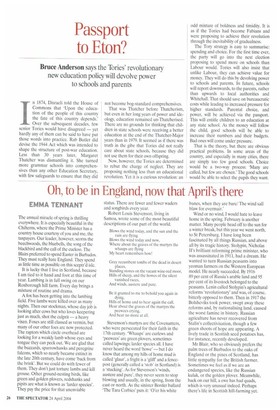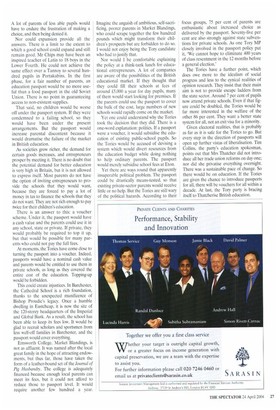Oh, to be in England, now that April's there
EMMA TENNANT
The annual miracle of spring is thrilling everywhere. It is especially beautiful in the Chilterns, where the Prime Minister has a country house courtesy of you and me, the taxpayers. Our leader, however, scorns the beechwoods, the bluebells, the song of the blackbird and the call of the cuckoo. The Blairs preferred to spend Easter in Barbados. They must really hate England. They spend as little time as possible on this sceptr'd isle.
It is lucky that I live in Scotland, because I am tied to it hand and foot at this time of year. Lambing is in full swing on our Roxborough hill farm. Every day brings a mixture of routine and drama.
A fox has been getting into the lambing field. Five lambs were killed over as many nights. Then our stockman, whose day job is looking after cows but who loves keepering just as much, shot the culprit — a heavy vixen. Foxes are still classed as vermin, but many of our other foes are now protected. The raptors which circle overhead are looking for a weakly lamb whose eyes and tongue they can peck out. We are glad that the buzzards, sparrowhawks and peregrine falcons, which so nearly became extinct in the late 20th century, have come 'back from the brink'. But we could do with fewer of them. They don't just torture lambs and kill grouse. Other ground-nesting birds, like green and golden plovers, redshanks and pipits are what is known as 'larder species'. They pay the price for that unenviable status. There are fewer and fewer waders and songbirds every year.
Robert Louis Stevenson, living in Samoa, wrote some of the most beautiful descriptions of our part of the world.
Blows the wind today, and the sun and the rain are flying Blows the wind today and now, Where about the graves of the martyrs the whaups are flying My heart remembers how!
Grey recumbent tombs of the dead in desert places, Standing stones on the vacant wine-red moor, Hills of sheep, and the howes of the silent vanished races, And winds, austere and pure.
Be it granted to me to behold you again in dying, Hills of home and to hear again the call, Hear about the graves of the martyrs the peewees crying, And hear no more at all.
Stevenson's martyrs are the Covenanters, who were persecuted for their faith in the 17th century. `Whaups' are curlews and 'peewees' are green plovers, sometimes called lapwings; larder species all. I have never heard the word `howe' — but I do know that among my hills of home mud is called `glaue, a fright is a `gliff and a fencepost (generally called a .stob' in Scotland) is a 'stucking'. As for Stevenson's 'winds, austere and pure', they never seem to stop blowing and usually, in the spring, from the east or north. As the sinister Border ballard 'The Tara Corbies' puts it: 'O'er his white
banes, when they are bare/ The wind sail blaw for evermair.'
Wind or no wind, I would hate to leave home in the spring. February is another matter. Many people head off to the sun for a winter break, but this year we went north, to St Petersburg. I have long been fascinated by all things Russian, and above all by its tragic history. Stolypin, Nicholas II's brilliant reforming prime minister, who was assassinated in 1911, had a dream. He wanted to turn Russian peasants into yeoman farmers on the Western European model. He nearly succeeded. By 1916 89 per cent of Russia's arable land and 95 per cent of its livestock belonged to the peasants. Lenin called Stolypin's agricultural reforms 'revolutionary' and was, of course, bitterly opposed to them. Then in 1917 the Bolsheviks took power, swept away these reforms and, by nationalising land, caused the worst famine in history. Russian agriculture has never recovered from Stalin's collectivisation, though a few green shoots of hope are appearing. A lively trade in Scottish seed potatoes has, for instance, recently developed.
Mr Blair, who so obviously prefers the palm trees of Barbados to the oaks of England or the pines of Scotland, has little sympathy for the British farmer. Sometimes we feel as if we are an endangered species, like the Russian kulak, or the golden plover. Meanwhile, back on our hill, a ewe has had quads, which is very unusual indeed. Perhaps there's life in Scottish hill-farming yet.
A lot of parents of less able pupils would have to endure the frustration of making a choice, and then being denied it.
Nor could expansion provide all the answers. There is a limit to the extent to which a good school could expand and still remain good. Mr Chips may have been an inspired teacher of Latin to 18 boys in the Lower Fourth. He could not achieve the same effect over a Tannoy to several hundred pupils in Portakabins. In the first phase, for a fair number of parents, an education passport would be no more useful than a food passport in the old Soviet Union. There is no point in guaranteeing access to non-existent supplies.
That said, no children would be worse off under the passport system. If they were condemned to a failing school, so they would have been under the present arrangements. But the passport would increase parental discontent because it would dramatise the failure of the market in British education.
As societies grow richer, the demand for certain goods increases, and entrepreneurs prosper by meeting it. There is no doubt that the potential demand for better education is very high in Britain, but it is not allowed to express itself. Most parents do not have the option of inviting entrepreneurs to provide the schools that they would want, because they are forced to pay a lot of money in tax to finance the schools that they do not want. They are not rich enough to pay twice for their children's education.
There is an answer to this: a voucher scheme. Under it, the passport would have a cash value and the parents could use it in any school, state or private. If private, they would probably be required to top it up, but that would be possible for many parents who could not pay the full fees.
At moments, the Tories have come close to turning the passport into a voucher. Indeed, passports would have a nominal cash value and parents would be entitled to use them in private schools, as long as they covered the entire cost of the education. Topping-up would be forbidden.
This could create injustices. In Barchester, the Cathedral School is a rich foundation, thanks to the unexpected munificence of Bishop Proudie's legacy. Once a humble dwelling in Eastcheap, it is now the site of the 120-storey headquarters of the Imperial and Global Bank. As a result, the school has been able to keep its fees low. It would bc glad to recruit scholars and sportsmen from less well-off families in Barchester, and the passport would cover everything.
Emsworth College, Market Blandings, is not as affluent. It was named after the local great family in the hope of attracting endowments, but thus far, those have taken the
form of a leather-bound set of the Journal of Pig Husbandry. The college is adequately
financed because enough local parents can meet its fees, but it could not afford to reduce those to passport level. It would require another few hundred a year. Imagine the anguish of ambitious, self-sacrificing, poorer parents in Market Blandings, who could scrape together the few hundred pounds which might transform their children's prospects hut are forbidden to do so. I would not enjoy being the Tory candidate who had to justify that.
Nor would I be comfortable explaining the policy at a think-tank lunch for educational entrepreneurs. A lot of companies are aware of the possibilities of the British educational market. If they thought that they could fill their schools at fees of around £5.000 a year for day pupils, many of them would start looking for premises. If the parents could use the passport to cover the bulk of the cost, large numbers of new schools would rapidly come on the market. Yet one could understand why the Tories took the decision that they did. There is a one-word explanation: politics. If a passport were a voucher, it would subsidise the education of existing public-school pupils. So the Tories would be accused of devising a system which would divert resources from the education budget while doing nothing to help ordinary parents. The passport would merely subsidise school fees at Eton.
Yet there are ways round that apparently insuperable political problem. The passport could be drastically means-tested, so that existing private-sector parents would receive little or no help. But the Tories are still wary of the political hazards. According to their focus groups, 75 per cent of parents are enthusiastic about increased choice as delivered by the passport. Seventy-five per cent are also strongly against state subventions for private schools. As one Tory MP closely involved in the passport policy put it, 'We cannot hope to eliminate 400 years of class resentment in the 12 months before a general election.' The Tories have a further point, which does owe more to the idealism of social progress and less to the cynical realities of opinion research. They insist that their main aim is not to provide escape ladders from the state sector. Around 7 per cent of pupils now attend private schools. Even if that figure could be doubled, the Tories would be far more interested in the welfare of the other 86 per cent. They want a better state system for all, not an exit visa for a minority. Given electoral realities, that is probably as far as it is safe for the Tories to go. But every step in the direction of passports will open up further vistas of liberalisation. Tim Collins, the party's education spokesman, points out that Mrs Thatcher did not introduce all her trade union reforms on day one; nor did she privatise everything overnight. There was a sustainable pace of change. So there would be on education. If the Tories are given the chance to introduce passports for all, there will be vouchers for all within a decade. At last, the Tory party is bracing itself to Thatcherise British education.



















































































 Previous page
Previous page